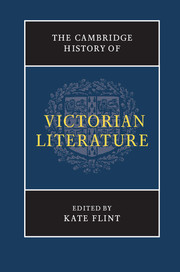Book contents
- Frontmatter
- Introduction
- PART I AUTHORS, READERS, AND PUBLISHERS
- PART II WRITING VICTORIA’s ENGLAND
- PART III MODES OF WRITING
- PART IV MATTERS OF DEBATE
- 15 Education
- 16 Spirituality
- 17 Material
- 18 Economics and finance
- 19 History
- 20 Sexuality
- 21 Aesthetics
- 22 Science and literature
- 23 Subjectivity, psychology, and the imagination
- 24 Cityscapes
- 25 The rural scene: Victorian literature and the natural world
- 26 ‘The annihilation of space and time’: literature and technology
- PART V SPACES OF WRITING
- PART VI VICTORIAN AFTERLIVES
- Select bibliography
- Index
22 - Science and literature
from PART IV - MATTERS OF DEBATE
Published online by Cambridge University Press: 28 March 2012
- Frontmatter
- Introduction
- PART I AUTHORS, READERS, AND PUBLISHERS
- PART II WRITING VICTORIA’s ENGLAND
- PART III MODES OF WRITING
- PART IV MATTERS OF DEBATE
- 15 Education
- 16 Spirituality
- 17 Material
- 18 Economics and finance
- 19 History
- 20 Sexuality
- 21 Aesthetics
- 22 Science and literature
- 23 Subjectivity, psychology, and the imagination
- 24 Cityscapes
- 25 The rural scene: Victorian literature and the natural world
- 26 ‘The annihilation of space and time’: literature and technology
- PART V SPACES OF WRITING
- PART VI VICTORIAN AFTERLIVES
- Select bibliography
- Index
Summary
H. G. Wells opens his satirical, visionary novel The Food of the Gods, published at the turn of the twentieth century in 1904, with a backward glance at a singular novelty that has emerged in the previous fifty years:
In the middle years of the nineteenth century there first became abundant in this strange world of ours a class of men, men tending for the most part to become elderly, who are called, and who, though they dislike it extremely, are very properly called ‘Scientists’. They dislike the word so much that from the columns of Nature, which was from the first their distinctive and characteristic paper, it is as carefully excluded as if it were – that other word which is the basis of all really bad language in this country.
Wells nips at the heels of this new class of ‘men’, so unworldly, but so insistent on each his own achievement that they dislike being classed in the gross – and, with a sly refusal to name it, he imports his own gross allusion to that ‘other word’ that asserts the body. Scientists, he suggests, see themselves as all intellect, but are trapped in their shuffling mediocre bodies and their anxious self-assertion.
- Type
- Chapter
- Information
- The Cambridge History of Victorian Literature , pp. 466 - 486Publisher: Cambridge University PressPrint publication year: 2012

